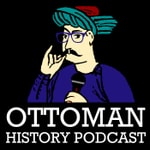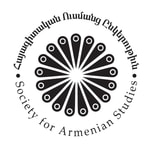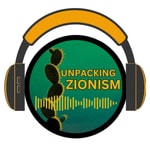Ottoman History Podcast – Details, episodes & analysis
Podcast details
Technical and general information from the podcast's RSS feed.

Ottoman History Podcast
Ottoman History Podcast
Frequency: 1 episode/31d. Total Eps: 147

Recent rankings
Latest chart positions across Apple Podcasts and Spotify rankings.
Apple Podcasts
🇩🇪 Germany - history
01/12/2024#99🇩🇪 Germany - history
02/09/2024#95
Spotify
No recent rankings available
Shared links between episodes and podcasts
Links found in episode descriptions and other podcasts that share them.
See allRSS feed quality and score
Technical evaluation of the podcast's RSS feed quality and structure.
See allScore global : 53%
Publication history
Monthly episode publishing history over the past years.
North Caucasian Refugees and the Late Ottoman State
jeudi 29 août 2024 • Duration
with Vladimir Hamed-Troyansky hosted by Chris Gratien & Can Gümüş | During the late 19th and early 20th century, tens of millions of migrants crossed the seas, settling in the Americas and beyond in a mass migration event that reshaped politics and economies throughout the world. In this episode, we focus on one of the most ignored groups within the history of those momentous events: North Caucasian Muslims. As our guest, Vladimir Hamed-Troyansky, explains, North Caucasian refugees fleeing Russian expansion became a large segment of the Ottoman migrant (muhacir) population and in turn, became a major new demographic component, constituting about 5% of the empire's citizens by WWI. Under the Muhacirin Commission created to facilitate their movements, they settled in remote provinces, from the edges of the Syrian desert to the plateaus of Central Anatolia, founding what would become major cities like Amman (modern-day Jordan) and constructing new diasporic identities in the process. As we discuss, these migrations not only changed the millions of people who became Ottoman refugees during the empire's last decade and their communities back home. They changed the nature of the Ottoman state itself. « Click for More »
An Ottoman Imam in Brazil
jeudi 11 avril 2024 • Duration
| In 1866, a series of unexpected events led to an Ottoman imam by the name of Abd al-Rahman al-Baghdadi ending up in Rio de Janeiro. In this episode, Ali Kulez explains how he got there, and what happened when al-Baghdadi became close with enslaved and free Afro-Brazilian Muslims, and attempted to teach them his vision of Islamic orthodoxy. In addition to exploring themes of Islam and race in Brazil, Kulez also traces how the translation of al-Baghdadi's travel narrative can offer a window onto the history of South-South relations into the present. In closing, he discusses the challenge of evaluating past solidarities and differentiating them from those we might want to see. « Click for More »
Ottoman Istanbul After Dark
mardi 12 décembre 2023 • Duration
| What did the nighttime mean in the early modern Ottoman Empire? In this episode, Avner Wishnitzer discusses his recent book As Night Falls: Eighteenth-Century Ottoman Cities After Dark (also available in Turkish translation by Can Gümüş as Gece Çökerken). He explains how the night was a time for sleep, rest, devotion, sex, crime, drinking, and even revolt. He also talks about the challenges of past sensory states, the influence of the late Walter Andrews on his work, and, finally, the relationship between his work as a historian and his work as an activist. « Click for More »
Istanbul and the Ottoman Olfactory Heritage
vendredi 22 juin 2018 • Duration
with Lauren Davis hosted by Susanna Ferguson
Download the podcast Feed | iTunes | GooglePlay | SoundCloud
What did Istanbul's Spice Bazaar smell like in Ottoman times? In this episode, we explore the historical smellscape of this iconic market space from its early history up to the present day. Through a story about Ottoman smells and their transformations in the twentieth century, we touch on the trade routes of exotic spices, Ottoman marketing practices, and the greener, more fragrant Istanbul that still lives in the memories of twentieth-century shopowners who spent their lives in and around the Bazaar. Finally, we consider how telling history through smell could change the way we think about the past and struggle to preserve it.
« Click for More »
Slavery and Servitude in the Ottoman Mediterranean
mardi 15 mai 2018 • Duration
with M’hamed Oualdi & Hayri Gökşin Özkoray hosted by Andreas Guidi
Download the podcast
Feed | iTunes | GooglePlay | SoundCloud
Our latest podcast in collaboration with The Southeast Passage examines how slavery flourished in the Ottoman Mediterranean in the wake of growing connectivity with other world regions and territorial expansion. The discussion draws out the ambiguity between slavery and servitude in the case of the Mamluks of the Tunisian Beylik during the eighteenth and nineteenth centuries. Which economic processes, legal interpretations, and geographic routes impacted the evolution of the slave trade from the sixteenth century until its abolition? What are the possibilities for and problems in retracing the self-narratives of those directly involved in the slave trade?
« Click for More »
Dervish Piety and Alevism in Late Medieval Anatolia
vendredi 20 avril 2018 • Duration
Episode 359
with Zeynep Oktay Uslu hosted by Matthew Ghazarian and Işın Taylan
Download the podcast
Feed | iTunes | GooglePlay | SoundCloud
In this episode, we explore the evolution of Abdal and Bektashi doctrine from the 14th to 17th centuries. The Abdals of Rum and the Bektashis were two dervish groups in Anatolia who by the 16th century would merge to become the Bektashi Sufi order. Many Bektashi beliefs and practices are also inter-connected with those of Alevi communities. By taking a closer look at Abdal and Bektashi poetry, we examine how poetry, fiction, and other aspects of dervish piety evolved into the core beliefs of contemporary Alevism in Turkey.
« Click for More »
Love Poems of an Ottoman Woman: Mihrî Hatun
jeudi 12 avril 2018 • Duration
with Didem Havlioğlu hosted by Chris Gratien
Download the podcast
Feed | iTunes | GooglePlay | SoundCloud
What did it mean to be a woman in the intellectual world of early modern Islamic empires? In this episode, our guest Didem Havlioğlu offers one answer to this question through the life and works of Mihrî Hatun, an Ottoman woman from 15th-century Amasya whose poetry survives to this day. Mihrî was unique within the male-dominated sphere of early modern love poetry, and as we discuss in this podcast, her position as a woman was integral to her poetry and its meaning. These poems and the relationships of this exceptional writer are the subject of Havlioğlu's new book entitled Mihrî Hatun: Performance, Gender-Bending, and Subversion in Ottoman Intellectual History (Syracuse University Press).
« Click for More »
Dragomans and the Routes of Orientalism
vendredi 30 mars 2018 • Duration
with Natalie Rothman hosted by Nir Shafir and Aslihan Gürbüzel
Download the podcast
Feed | iTunes | GooglePlay | SoundCloud
Dragomans are often known as diplomatic translators, but their responsibilities and roles went much further than being mere interpreters. In this podcast, we speak with Natalie Rothman about how dragomans negotiated both linguistic space and social space across the Eastern Mediterranean. Focusing specifically on the case of Venetian dragomans, we discuss their training and how they managed to become brokers of knowledge and connections between the Ottoman Empire and myriad publics in Venice and beyond. In the second half of the podcast, we delve a bit deeper and examine how dragomans came to contribute to the budding world of Orientalist knowledge among seventeenth-century European scholars.
« Click for More »
States of Emergency in the Late Ottoman Empire
mercredi 28 février 2018 • Duration
with Noémi Lévy-Aksu hosted by Taylan Güngör and Michael Talbot
Download the podcast
Feed | iTunes | GooglePlay | SoundCloud
Idare-i örfiyye (or örfi idare), loosely translated as a “state of emergency or siege,” was a neologism introduced in the first Ottoman constitution in 1876 to allow the suspension of ordinary legal order in Ottoman localities in case of actual or potential uprisings. While the term clearly referred to the Ottoman legal tradition, the idare-i örfiyye was also inspired by contemporary definitions of regimes of exception in France and other countries. This conversation offers an insight into the genesis of this legal notion and seeks to understand the political, geographic and social impact of the widespread implementation of idare-i örfiyye in the Ottoman provinces during Abdülhamid II reign and the early Young Turk period.
« Click for More »
The Republic of Arabic Letters
vendredi 23 février 2018 • Duration
with Alexander Bevilacqua hosted by Maryam Patton and Shireen Hamza
Download the podcast
Feed | iTunes | GooglePlay | SoundCloud
When and how did European scholars first begin to seriously study Islam and the Arabic language? It has often been assumed that Medieval misconceptions and polemic towards Muslims were not cast off until the secularism of the European Enlightenment. In this episode, we learn that the foundations of the modern Western understanding were actually laid as early as the 17th century. Alexander Bevilacqua shares his research on the network of Catholic and Protestant scholars he calls the “Republic of Arabic Letters.” These scholars went to great lengths to learn Arabic and gather Arabic books and manuscripts, and eventually produced careful translations of the Qur’an and histories of Muslim societies based on Arabic sources.
« Click for More »









